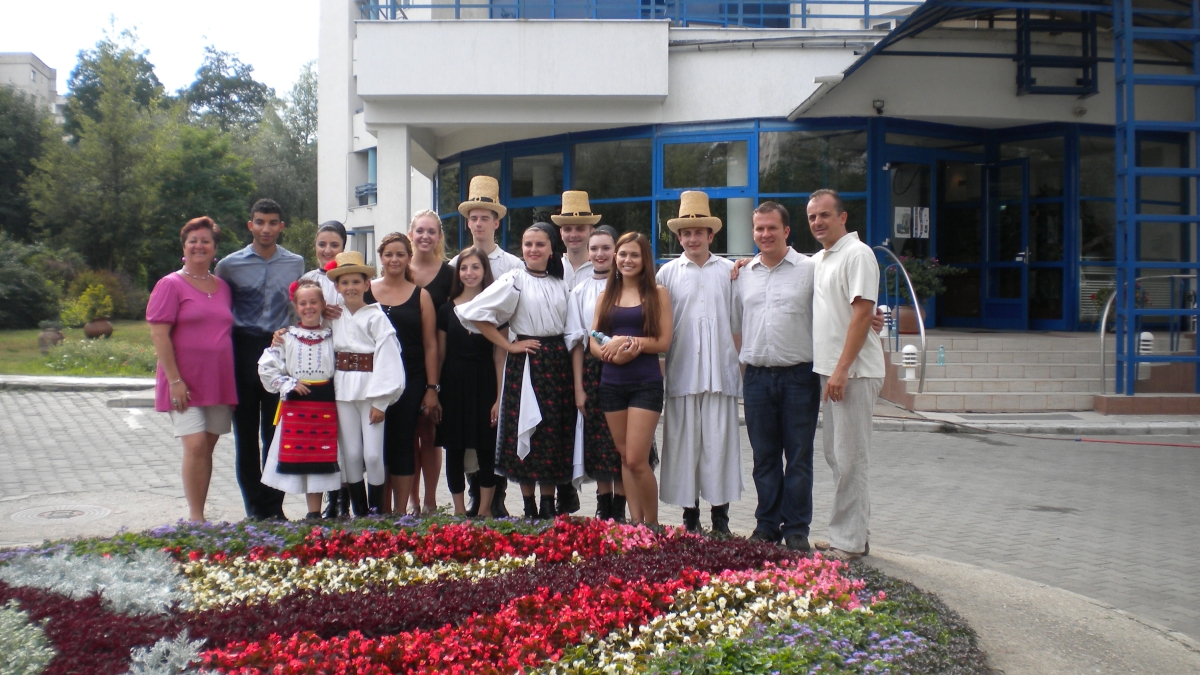Romania, Central Europe popular study abroad destinations

For the past 15 years, the Romanian studies program in ASU’s School of International Letters and Cultures has joined forces with the faculty of Philology at Babes Bolyai University in Cluj-Napoca, Romania and several other Central European universities to offer an opportunity for interested students to study abroad in Eastern and Central Europe.
“The summer study abroad program in Romania and Central Europe is designed to give students a comprehensive view of the rich and unique cultural history of pre- and post-communist Europe,” says faculty director Ileana Orlich.
The program enriches students' knowledge about the region as a peripheral node linking Eastern and Western Europe. Students learn firsthand about the effects of communism, the impact of ethnic, religious and social conflict, and the cultural diversity of the peoples inhabiting this now post-communist, European Union area.
Students in the program take six credit hours chosen from cross-listed courses in Romanian, English, international letters and cultures, political science, religious studies, cultural geography, and/or history. Because the program offers courses that fulfill most every general studies designation, it is suitable for any major.
While earning credits toward their degree, or earning credits toward a Romanian minor, students in the Romania and Central Europe study abroad program are immersed in the rich cultures of Eastern and Central Europe, visiting the capitals and significant cities of the former Austro-Hungarian Empire: Bucharest, Budapest, Vienna, Prague and Bratislava.
During the four-week summer program, students visit National World Heritage sites and historically renowned places along the Romanian countryside, such as the castles and medieval fortresses of Transylvania – Peles Castle, Bran Castle, and the medieval town of Sighisoara (the birthplace of Dracula). They also visit the remote monasteries of northern Moldova at the border with Ukraine, and the ancient city of Constanta on the coast of the Black Sea, which is the site of Greek ruins, Roman mosaics, Turkish mosques, and beautiful sandy beaches.
For the bulk of the trip, students stay in Cluj-Napoca, the capital city of Transylvania. Located in northwestern Romania and situated on the site of an ancient Roman castrum (military outpost), Cluj is rich in history and culture featuring Gothic and Byzantine style churches, nearby monasteries, and an old downtown area with medieval, Baroque, and turn-of-the-century buildings.
The program has made a meaningful impact on its past participants. Jacob Pritchett, who participated in the program this past summer, called the trip “a life-changing experience. From the splendor of structures to the richness of cultures, I experienced an adventure different from anything I expected."
“Located at the crossroads of the former Russian, Austro-Hungarian and Ottoman Empires, Romania is an incredible place culturally and linguistically,” says Orlich. “I enjoy going abroad with my students because we see and learn so much beyond what is possible in the classroom.”
Orlich was born in Bucharest, Romania, and came to Arizona in 1975. After earning her doctorate in English and comparative literature, she was a lecturer in ASU’s Department of English before becoming an assistant professor in 1998, and a full professor of Romanian studies and comparative literature in 2005. Founder and director of the largest Romanian studies program in the United States, Orlich has been introducing students at ASU to a broad global perspective, and encouraging them to expand their world experience geographically, historically, linguistically and culturally for more than 25 years.
More than a committed professor, Orlich is a devoted liaison between her two home countries, mediating the distance between cultures, and bringing Americans and Romanians together. Appointed as Romania’s Honorary Consul General in Arizona in 2010, she has helped to organize the process by which Romanian citizens in Arizona are able to vote in Romania’s presidential election, and supports the development of friendly relations between Romania and Arizona and their respective universities, a crucial factor in the success of the study abroad program.
Orlich's other honors include being named a 2012 ASU President’s Professor, 2011 Professor of the Year by the ASU Parents Association, 2001 ASU Centennial Professor, a 2006 Fulbright Scholar award, a 2006 National Endowment for the Humanities award for literary translation, a 2011 Fulbright Specialist award, and the 2004 Medalia Ordinal Cultural al Romaniei, Romania's highest academic and cultural distinction awarded by the President of Romania.
Former participant Andrew Davidon encourages other students to sign up for the Romania and Central Europe study abroad program, saying, "The Romanian summer program caters to a wide variety of disciplines and offers sophisticated lecturers, awe-inspiring cityscapes and luscious country sides. Take advantage of a unique and affordable opportunity to experience the charming and culturally opulent space of eastern and central Europe.”
The School of International Letters and Cultures’ study abroad programs are among the longest running and most prestigious at Arizona State University. Founded in 1981, and directed by knowledgeable, world-class faculty, the programs offer students the opportunity to experience and study international humanities and learn languages firsthand.
For more information about the Romania and Central Europe study abroad program contact Professor Orlich at orlich@asu.edu.
Applications accepted through the ASU Study Abroad Office.
The School of International Letters and Cultures is an academic unit of the College of Liberal Arts and Sciences